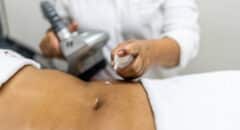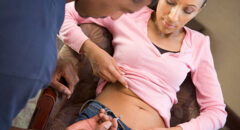 These days, more women living with HIV are not only having healthy pregnancies, they are also giving birth to healthy, HIV-negative babies. Although every woman’s pregnancy experience is different, it’s important for all expectant mothers to practice good nutrition and wellness habits that support having a healthy pregnancy for themselves and the baby.
These days, more women living with HIV are not only having healthy pregnancies, they are also giving birth to healthy, HIV-negative babies. Although every woman’s pregnancy experience is different, it’s important for all expectant mothers to practice good nutrition and wellness habits that support having a healthy pregnancy for themselves and the baby.
If you are a mom-to-be or are family planning for the future, here are things to consider when it comes to your pregnancy.
Pre-Pregnancy
Creating an optimal environment to support a baby is important before becoming pregnant. You’ll want to be as healthy as possible and being at your ideal body weight before pregnancy is a part of that. Being overweight or obese can increase your risk of complications. Consult with your obstetrician to have a complete physical with lab work. Abnormal test results for blood fats (lipids), sugars and pressure should be addressed prior to pregnancy, as elevated levels that aren’t managed can be extremely dangerous.
During Pregnancy: Do
After working with your doctor to discuss how to become pregnant and a proper HIV medication regimen, make sure to do the following once you become pregnant:
- Stay properly hydrated with water: Water or mineral water is recommended. Juices are filled with added sugars and are not recommended for women living with HIV because they increase the risk for gestational diabetes. If you need a little more flavor in your water, try adding slices of cucumber, lemon or lime.
- Exercise: Not only is exercise during pregnancy good for mom, but research shows that babies born to mothers who exercise during pregnancy are born at healthier weights. Follow your doctor’s recommendations for proper exercise and exercise as you are able to tolerate.
- Get plenty of rest: Fatigue and overexertion will wear on your body and immune system
- Eat a balanced diet: Eating a diet rich in whole foods is recommended. Whole foods include: whole grains, fresh fruits and vegetables, and lean and plant-based proteins such as chicken and turkey (remove the skin), low-mercury fish and lean beef. The combination of pregnancy and HIV increases a woman’s protein and iron needs, so work with your doctor or a dietician to ensure you are getting adequate amounts of vitamins, minerals and nutrients.
During Pregnancy: Don’t
The following foods and drinks should be avoided during your pregnancy, as they contain harmful chemicals and bacteria for you and your baby:
- Alcohol
- Excessive caffeine
- Some types of herbal teas
- Raw or undercooked eggs, poultry, fish or meat (Note: It is recommended to eat only two servings of fish per week)
- Luncheon meats or deli meats (unless they have been reheated until steaming hot)
- Raw or unpasteurized dairy products
When cooking, foods should be prepared without added sugar, salt or fats like oil and butter.
Following these tips and working closely with your doctor, dietician or midwife to develop a pregnancy game plan that’s right for you will help you have a healthy pregnancy that doesn’t compromise your health or your child’s.
Visit the BlackDoctor.org Living with HIV center for more helpful articles and tips.







